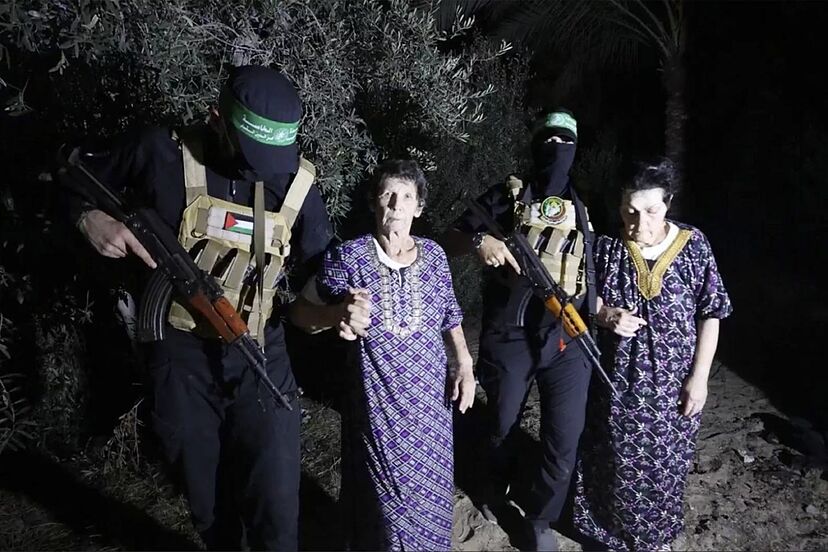Diplomatic Efforts Lead to Release of Two Captives
Two women held captive by Hamas in Gaza have been released, marking a significant development in the ongoing crisis. This release comes following international mediation efforts led by Qatar and Egypt, as confirmed by Hamas.
Humanitarian Reasons Cited for Release
Hamas spokesperson Abu Obeida stated that the captives, 85-year-old Yocheved Lifshitz and 79-year-old Nurit Cooper, were released on “humanitarian reasons and poor health grounds.” This gesture is expected to provide relief to the families of the released captives.
Calls for Unconditional Release Amid Escalating Conflict
The release of these hostages is significant in the context of escalating tensions in the region. It follows Hamas’s assault on southern Israel on October 7, during which the group took over 200 people captive, including Israelis and dual nationals. The release comes in response to calls from Israeli Prime Minister Benjamin Netanyahu, human rights groups, international organizations, and the families of the captives for the unconditional release of all hostages.
In a development that offers a glimmer of hope amid the ongoing crisis in the region, Hamas has released two captives held in Gaza. The Palestinian group, in coordination with international mediators, facilitated the release of these hostages, an 85-year-old Yocheved Lifshitz and 79-year-old Nurit Cooper.
Hamas spokesperson Abu Obeida officially announced this humanitarian act, stating that the release was prompted by “humanitarian reasons and poor health grounds.” The International Committee of the Red Cross (ICRC) confirmed the release of these captives, reflecting the significance of this move in the ongoing conflict.
This release comes against the backdrop of escalating tensions in the region. On October 7, Hamas launched an assault on southern Israel, resulting in the capture of over 200 individuals, including Israelis and dual nationals. Tragically, Israeli authorities reported that more than 1,400 people lost their lives during the attack, with a significant number of casualties being civilians.
Israeli Prime Minister Benjamin Netanyahu, alongside numerous human rights organizations, international bodies, and the families of the captives, had persistently called for the unconditional release of all hostages held in Gaza. Their collective plea highlights the urgency of addressing the hostage situation.
Notably, this marks the first hostage release since the October 7 attack. In a prior instance, Hamas released two women with United States citizenship, Judith Raanan and her daughter Natalie, following mediation efforts led by Qatar. A spokesperson from the Qatar foreign ministry confirmed that the release was the result of “many days of continuous communication” with all involved parties.
However, it’s essential to acknowledge that not all efforts to secure hostage releases have been successful. Hamas had expressed a willingness to release two additional captives alongside Judith and Natalie in a previous attempt, but the Israeli authorities declined the offer. Israel has described this claim as “mendacious propaganda” and has suggested that Hamas might be seeking to improve its image amid international condemnation over the conflict’s harrowing events.
The ongoing conflict has put the families of the kidnapped and held captive in an agonizing dilemma. Some have urged the Israeli government to prioritize securing the release of the hostages, while others understand the emphasis on confronting Hamas directly.
Carmel Gorni, a political activist who lost a cousin, Yiftah Gorni, during the assault, emphasized the need for dialogue with Hamas, saying, “We can’t always resort to war. We have so many Palestinian prisoners we can swap for our people.” She expressed concerns that a potential ground invasion could lead to further casualties, including the hostages.
Furthermore, there are reports suggesting that the United States is pressing Israel to delay a ground assault in order to allow more time to secure the release of those held captive.
This situation occurs in the broader context of the Israeli military’s preparations for an expected ground invasion of the besieged Gaza Strip. Israel’s response to the conflict, including a relentless campaign of airstrikes and restrictions on essential resources to Gaza’s 2.3 million residents, has been met with criticism from various quarters. These actions have led to severe humanitarian conditions and have resulted in significant loss of life, with Palestinian authorities reporting that more than 5,000 Palestinians have been killed in the Israeli bombardment.
The release of hostages in Gaza is a welcome development, but the challenges and complexities of the ongoing crisis continue to cast a long shadow over the region.















